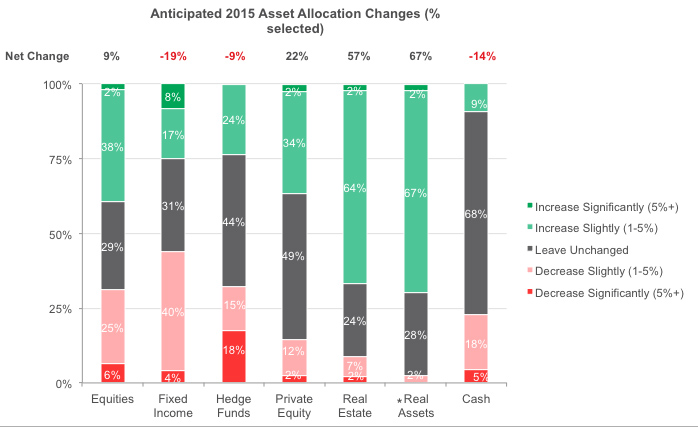Blog: There are growing signs pension schemes are on the verge of a significant shift in their investment approaches, with ramifications beyond the current period.
This is encouraging as deficits are rising and the industry needs to do something different to meet the challenges of today’s markets.
We recently surveyed 169 of our largest institutional clients – representing £8tn in assets, a majority of which were pension schemes – about their asset allocation intentions for 2015.
We found many were focused on growth rates in developed economies, divergent monetary policies and the potential for deflation, as well as escalating geopolitical tensions, with Russia the main area of concern.
As a result, the majority of respondents are planning to rebalance their portfolios in the next 12 months to include more alternative investments and non-traditional fixed income strategies that seek to provide returns across varying market conditions.
How do you anticipate changing your allocations in 2015?

Source: BlackRock
The most notable shift we detected from the survey was a widespread intention to allocate more to real assets and real estate.
Some 69 per cent of investors surveyed said they planned to increase their allocation to real assets, with just 2 per cent planning to decrease their allocation – in other words, an intention to increase of 67 per cent among all clients.
There was a 57 per cent net intention to increase to real estate, and one of 22 per cent to private equity. Equities look set for a more modest overall increase of 9 per cent.
To accommodate these shifts, 44 per cent of investors in Europe are planning to decrease their allocations to fixed income, with just 23 per cent planning to grow their bond portfolio, resulting in net planned reduction of 21 per cent.
There is also a clear intention to reduce allocations to cash and hedge funds, which were negative at net 14 per cent and 9 per cent, respectively.
Digging further into fixed income, we found a net 47 per cent of investors in Europe plan to increase allocations to unconstrained strategies, which seek to move beyond the benchmark and invest in a much broader range of fixed income products such as high yield, infrastructure and private market debt.
Respondents also revealed plans to allocate more heavily to emerging markets (net 40 per cent) and US bank loans (33 per cent).
These moves will come largely on the back of a reduction in core-plus allocations, to which a net 25 per cent of institutional investors intend to reduce their allocations.
The majority of respondents are planning to rebalance their portfolios in the next 12 months to include more alternative investments and non-traditional fixed income strategies
These results confirm what we have known anecdotally for a while: pension schemes are actively seeking to move beyond traditional approaches to asset allocation in order to include a broader mix of assets in their portfolios.
However, while the survey reveals a widespread intention to allocate more to real assets and non-core fixed income, it was noticeable that the large majority of clients are only planning slight portfolio adjustments for now.
We expect the trends revealed in the survey to persist over the next few years as investors continue to explore new sources of yield, diversification and inflation protection – and become increasingly confident in doing so.
Investors need to focus on their desired outcomes and strategies that will get them there, and it is clear this is happening today with renewed focus.
Arno Kitts is head of UK institutional at BlackRock

























